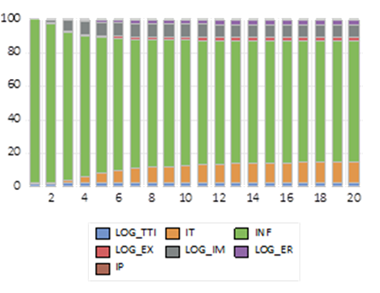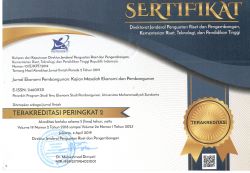Macroeconomic Shifts in Indonesia: Analyzing the Impact of The United States (US) – China Trade War
DOI:
https://doi.org/10.23917/jep.v26i1.10790Keywords:
Trade War, Inflation, Export, Import, Exchange Rate, Industrial Production IndexAbstract
The trade war between the United States and China has created global trade tensions that have had a significant impact on the economies of various countries, including Indonesia. This study analyzes the effects of the trade war, represented by the Trade Tension Index and Import Tariff variables, on Indonesia's macro economy during the 2018–2023 period using monthly data. The macroeconomic variables analyzed include inflation, exports, imports, exchange rates, and industrial production indices. The VECM method is used to evaluate the short-term and long-term effects of the trade war on these variables. The results show that the trade war have a significant effect, both in the short and long term, on inflation, exports, imports, and exchange rates. However, the effect on the industrial production index is not significant. These findings indicate that the trade war not only affects Indonesia's price stability and international trade but also has implications for exchange rate volatility, which can complicate the management of monetary and trade policies. The results of this study emphasize the importance of strengthening the resilience of the trade sector and developing adaptive industrial policies to mitigate the negative impacts of trade wars while maximizing opportunities from international trade dynamics.
Downloads
References
Aba, F. X. L. (2021). Institutional change and macroeconomic variables in the ASEAN—
Indonesia, Vietnam, and Cambodia: The effects of a trade war between China and USA.
Economies, 9(4). https://doi.org/10.3390/economies9040195
Adrian, M. A., & Rofiuddin, M. (2023). The US-China Trade War in Macroeconomic Studies of the Indonesian Sharia Stock Index. Shirkah: Journal of Economics and Business, 8(3), 218–233. https://doi.org/10.22515/shirkah.v8i3.538
Aminarta, A. A., & Kurniawan, M. L. A. (2021). Analysis of Macroeconomic Indicators Against the Composite Stock Price Index (CSPI) in Indonesia: Vector Error Correction Model (VECM) Approach. Journal of Economics Research and Social Sciences, 5(2), Layouting. https://doi.org/10.18196/jerss.v5i2.12267
Bank Indonesia. (2020). Strategi Percepatan Transformasi Ekonomi.
Charbonneau, K. B. (2019). The Impact of a Trade War: Assessment of the Current Tariffs and Alternative Scenarios. https://www.bankofcanada.ca/2019/07/staff-analytical-note-2019-20/
Cristanto, F. A., & Bowo, P. A. (2021). Determinants of Indonesian Trade Balance: A Vecm Analysis Approach. Economics Development Analysis Journal, 10(4), 463–474. https://doi.org/10.15294/edaj.v10i4.45909
Fajgelbaum, P. D., & Khandelwal, A. K. (2022). The Economic Impacts of the US-China Trade War. Annual Review of Economics, 14, 205–228. https://doi.org/10.1146/annurev-economics-051420-110410
Febrio N. Kacaribu, P. D., Lumbanraja, A. U., & Sabrina, S. (2019). Current Account Deficit : The Unresolved Homework. Macroeconomic Analysis Series: Indonesia Economic Outlook, 1–10.
Hapsari, M. R., Astutik, S., & Soehono, L. A. (2020). Relationship of Macroeconomics Variables in Indonesia Using Vector Error Correction Model. Economics Development Analysis Journal, 9(4), 374–390. https://doi.org/10.15294/edaj.v9i4.38662
Indonesia, B. (2022). Synergy. https://www.bi.go.id/en/publikasi/ruang-media/pidato-dewan-gubernur/Documents/Book_PTBI_2022_en.pdf
Kementrian perdagangan republik indonesia. (2023). Perdagangan Asean-China Sebelum Dan Setelah Implementasi Acfta Periode 2013-2022. 1–8.
Khalil, M., & Strobel, F. (2024). US trade policy and the US dollar. Journal of International Economics, 151, 103970. https://doi.org/10.1016/j.jinteco.2024.103970
Kurniawan, A., & Rizal Luthfi, K. (2023). Impact of the US-China Trade War on Foreign Trade of Emerging Economies: Brazil, South Africa, and Indonesia. Jurnal Ilmu Sosial Dan Ilmu Politik, 27(2), 157. https://doi.org/10.22146/jsp.69215
Laksmana, V. C. (2024). The Impact of the Trade War Between China and the U . S . on the Economy of Indonesia. 5(10), 3769–3779.
Li, C., & Gan, Y. (2019). Trade Conflicts and China’s Macroeconomic Fluctuations ---An Empirical Analysis Based on Vector Autoregression Model. ITM Web of Conferences, 25, 01007. https://doi.org/10.1051/itmconf/20192501007
Maghfiroh, L. (2021). The US-China Trade War and Factors Affecting Indonesian Exports. Efficient: Indonesian Journal of Development Economics, 4(2), 1230–1241. https://doi.org/10.15294/efficient.v4i2.45848
Manna, G. C., Office, C. S., & Delhi, N. (2015). Exploring an Alternative Index of Industrial Production. 4, 169–177.
Maria, C. (2022). The Impact of Trade Agreement and War on Specific Indonesia-China Bilateral Trade. Journal of Research on Business and Tourism, 1(2), 128. https://doi.org/10.37535/104001220214
Mashilal, M., Amalia, F., & Visita, L. (2024). Global Economic Policy Uncertainty and Islamic Stock Market in Indonesia. Muqtasid: Jurnal Ekonomi Dan Perbankan Syariah, 14(2), 115–132. https://doi.org/10.18326/muqtasid.v14i2.115-132
MOLNAR, A., & VIKTOR, P. (2023). China’s Impact on the US Dollar Exchange Rate. The Eurasia Proceedings of Educational and Social Sciences, 32, 71–79. https://doi.org/10.55549/epess.1412819
Ningsih, S. S., & Harningtias, A. (2023). The Effect of International Trade (Export and Import) on Indonesia Economic Growth 2015 - 2019. Indonesian Journal of Accounting and Financial Technology, 1(2), 13–24. https://doi.org/10.55927/crypto.v1i2.4263
Pan, L. (2023). Analysis of the Impact of Sino-US Trade War on Manufacturing Industry. Journal of Education, Humanities and Social Sciences, 23, 442–446. https://doi.org/10.54097/ehss.v23i.12931
Pratiwik, E., & Prajanti, S. D. W. (2023). Rupiah exchange rate: the determinants and impact of shocks on the economy. Jurnal Ekonomi & Studi Pembangunan, 24(1), 100–126. https://doi.org/10.18196/jesp.v24i1.18016
Prieto, A. B. T., & Lee, Y. (2019). Determinants of stock market performance: var and vecm designs in Korea and Japan. Global Business and Finance Review, 24(4), 24–44. https://doi.org/10.17549/gbfr.2019.24.4.24
Purwono, R., Heriqbaldi, U., Esquivias, M. A., & Mubin, M. K. (2022). The American–China Trade War and Spillover Effects on Value-Added Exports from Indonesia. Sustainability (Switzerland), 14(5). https://doi.org/10.3390/su14053093
Rose, A. K. (2020). The causes of trade tensions and their consequences for financial stability. Seoul Journal of Economics, 33(3), 265–281. https://doi.org/10.22904/sje.2020.33.3.001
Salim, T., & Soelistyo, A. (2024). Analysis of exchange rates in the economic uncertainty era. Optimum: Jurnal Ekonomi Dan Pembangunan, 14(1), 82–94. https://doi.org/10.12928/optimum.v14i1.9750
Shafique, A., & Bhutta, N. T. (2024). Assessing conditional volatility due to trade war in the G-7 stock markets. Social Sciences & Humanities Open, 9, 100768. https://doi.org/10.1016/j.ssaho.2023.100768
Shi, Y., Wang, L., & Ke, J. (2021). Does the US-China trade war affect co-movements between US and Chinese stock markets? Research in International Business and Finance, 58, 101477. https://doi.org/10.1016/j.ribaf.2021.101477
Sulistiyowati, L. N., & Pratama, S. V. (2023). Indonesia’s macroeconomic conditions during United States-China trade war. Jurnal Ekonomi Dan Bisnis, 26(2), 509–530. https://doi.org/10.24914/jeb.v26i2.6252
Susetyo, D. (2022). Determinants of Foreign Direct Investment (Fdi) in Indonesia: Short Term and Long Term. Modern Economics, 33(1), 72–81. https://doi.org/10.31521/modecon.V33(2022)-10
Wangke, H. (2020). Implications of United States - China Trade War to Indonesia. International Journal of Business and Economics Research, 9(3), 151. https://doi.org/10.11648/j.ijber.20200903.18
Widayat, W., Hartati, B., & Adillah, M. A. (2024). The Legal Implication of US-China Trade War on Indonesia's Policy Relating to Palm Oil Industry. Indonesian Law Journal 17(2), 17–27.















